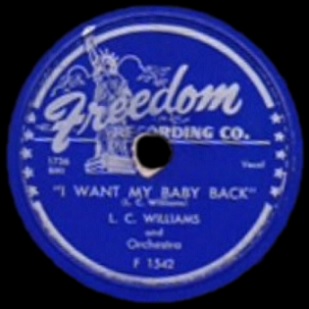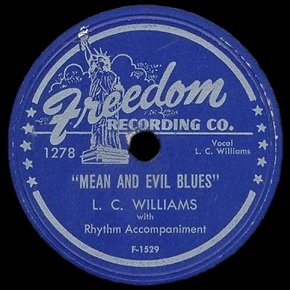L. C. Williams: “I Want My Baby Back”
25 Thursday Mar 2021
Written by Sampson
Tags
No tags :(
Share it
FREEDOM 1542; JULY 1950

To the very end of their all too short existence Freedom Records of Houston were releasing captivating singles in a wide variety of styles cut by an impressive roster of artists while backed by the best house band in the business and yet, as we’ve said each time out, it amounted to very little.
Despite the consistent quality of their output by their entire roster they inexplicably scored few legitimate hits, though one which did make the national charts was a blues record by today’s artist L.C. Williams.
Yet in spite of that success Williams didn’t stop also trying to connect in rock ‘n’ roll and after a sabbatical from that field over the past few releases he’s back with another effort that – while maybe not quite polished enough to be hit material in its own right – showed that virtually anyone under contract for them elevated their game as soon as they walked into the studio.
Come On Back
One of the vexing issues with doing a website like this to chronicle the entire history of a musical genre as massive as rock ‘n’ roll is the knowledge that even though we’re attempting to cover every single release in the field, we have to draw the line somewhere.
One of those “somewheres” is in adamantly avoiding non-rock output of artists who delved into rock at other times. That means sidestepping a few pop tunes by Ivory Joe Hunter, some classically tinged jazz efforts by Todd Rhodes and in the case of Freedom Records own star performer, Goree Carter, not reviewing his initial blues “demo” that they surreptitiously recorded without his knowledge and issued as one of their first releases before he did an about face and refused to cut blues and stuck exclusively to rock ‘n’ roll.
The reason that we avoid these of course is they are mere side stories to the major theme here which is rock’s evolution. Those records, and many others we skipped over by some big-name acts, were NOT rock and so they play no part in the major plot we’re trying to make some sense of.
Yet we also know that many of these artists have had very little written about them and so visitors landing in search of information on them might be disappointed to find nothing written about records that fall outside of the rock umbrella.
Such is the case with L.C. Williams, a blues artist by in large who also cut a handful of pure rock tunes which are the only ones we’re covering. That means his hit, Ethel Mae, was only mentioned in passing when we reviewed – and effusively praised – the scorching rocker Shout, Baby, Shout on the flip side.

It’s also the reason why we’ve ignored much of his subsequent output. Not that it isn’t worth revisiting, the one side of his last release, Mean And Evil Blues, is pretty good and very faintly hints at his rock side without getting close enough to it to justify its inclusion here.
So while we realize that the full story of L.C. Williams the artist is left with unfortunate gaps with our approach, this isn’t a website devoted to him, or any other individual, but rather to rock ‘n’ roll… whoever records it and whenever they choose to play it.
Luckily with I Want My Baby Back Williams has consented to give us another rock side and while not quite up to his high water mark in this area it’s still one record that was definitely worth the wait.
Just Got To The River
It’s amazing how different one man’s voice can sound at different times. When Williams is wallowing in the blues he sounds worn down by life, a half century older than his twenty one years.
But whenever he cuts a rocker those years are magically stripped away and you’re left with a vital young man on the precipice of a far more exciting life.
Yet the odd thing is on I Want My Baby Back there’s no reason for him to actually be as enthusiastic as he sounds. In fact he should be far more despondent over his plight as he’s telling us that his girlfriend has left – and is seemingly hiding out from him which raises all sorts of questions as to what he did to get her to leave in the first place – and he’s hunting high and low for her. But it’s almost as if he seems to be treating this as some sort of game by the sounds of it… not in term of what he’s saying, which fits all of the break-up tropes, including his threat to drown himself if she doesn’t return, but in HOW he’s delivering it.

Williams is full of vigor and wild-eyed eagerness, whooping it up vocally as he’s on the prowl for his baby. That the two components don’t match up well has to be held against the song which is the primary reason this is a notch or two below his records with a more singular focus, but when taken strictly as an onrushing wave of aural exuberance this is really pretty hard to resist.
Never possessing the best voice no matter his approach, Williams definitely sounds a little ragged here, though I suppose you could pass it off as him being distraught if you wanted to, but his high-octane delivery is determined to steamroll any questions and sweep you up in the sonic onslaught.
While many of the lyrics here are taken from the standard issue playbook they give all rock artists when starting out that doesn’t mean they aren’t reasonably effective in what they’re asked to do. His declaration that he wants his ex-girlfriend to join him for a joyride around town in his new Cadillac is the type of bizarre off-the-wall statement made by a delusional optimist that we’ve come to love seeing flaunted by a lot of rockers who are so wrapped up in satisfying their own self-indulgent whims that they become oblivious to reality.
But hey, when you’re getting a chance to cut loose again after being pretty downcast on your blues tracks, I guess everything is fair game.
Gonna Take A Ride
Of course Williams, a drummer by trade, wouldn’t be able to fully convey this boisterous attitude all by himself which is why the tight-knit Freedom studio band behind him is so vital in making this work.
Yet as good as they are at times here, it’s also their shortcomings in the arrangement which actually prevents I Want My Baby Back from being even better than it is.
First the good… the song charges out of the gate with Williams’ full-throated stop-time shouts as the rhythm section sticks behind him as close as his shadow all of which then gets capped off by the horns adding the punctuation marks. It’s muscular, tough and aggressive, all the things it needs to convey the right message in this setting.

But then it goes off the rails when the solos come along, for rather than giving them to the tenor sax, or Goree Carter’s guitar, they let the trumpet take it which as we all know in rock ‘n’ roll poses far more problems than solutions for any song.
Not surprisingly here the inclination is to revert to a jazzier riff that sounds out of place in terms of attitude alone that you think you’re hearing a different record cut by a different band in an entirely different decade. But then, just as quickly as it arrived, it disappears and they head back to solid ground.
When they stick with the simple, if not simplistic, template of uptempo rock songs they do everything expected of them and do it pretty well, as usual. We could argue that it’d help if they singled out a few instruments in the arrangement even without giving them soloing spots, be it some jagged fills by Carter or a brief pounding assault on the treble keys of the piano in a turnaround, but on the whole they keep their parts unified so nothing specific stands out but instead creates a suitably dense sound. In fact the only instrument that gets any sneaky moments to shine are those drums, whether Williams himself or Allison Tucker holding the sticks.
But just as you’re content to let that game plan play out they return with another ill-suited trumpet led interval and you wonder just what benefit there was in taking someone who was primarily a blues artist yet was fully comfortable in rock ‘n’ roll and then tossing in an overtly jazz-like touch that’s far away from both of those idioms.
No Right To Cry
Despite its drawbacks there’s still enough here to enjoy, especially the joyous spirit with which they all carry it off.
Whether L.C. Williams was intent on keeping his options open for the future by playing something outside his primary pursuit, or if he was simply playing in the kind of places that required satisfying two diverse groups of patrons and thus he needed original material that had genre specific appeal, one can’t say.
What is easier to judge is the fact that, for a variety of reasons, he was definitely not going to become a rock star even had he devoted all of his efforts to this type of music, but for somebody who only occasionally moonlighted as a rocker I Want My Baby Back does a reasonable job of keeping him relevant.
It may be awhile before he returns to this field, but as long as he keeps meeting expectations each time out we’ll be more than happy to leave the light on in the window for when he comes around again.
SPONTANEOUS LUNACY VERDICT:

(Visit the Artist page of L. C. Williams for the complete archive of his records reviewed to date)
